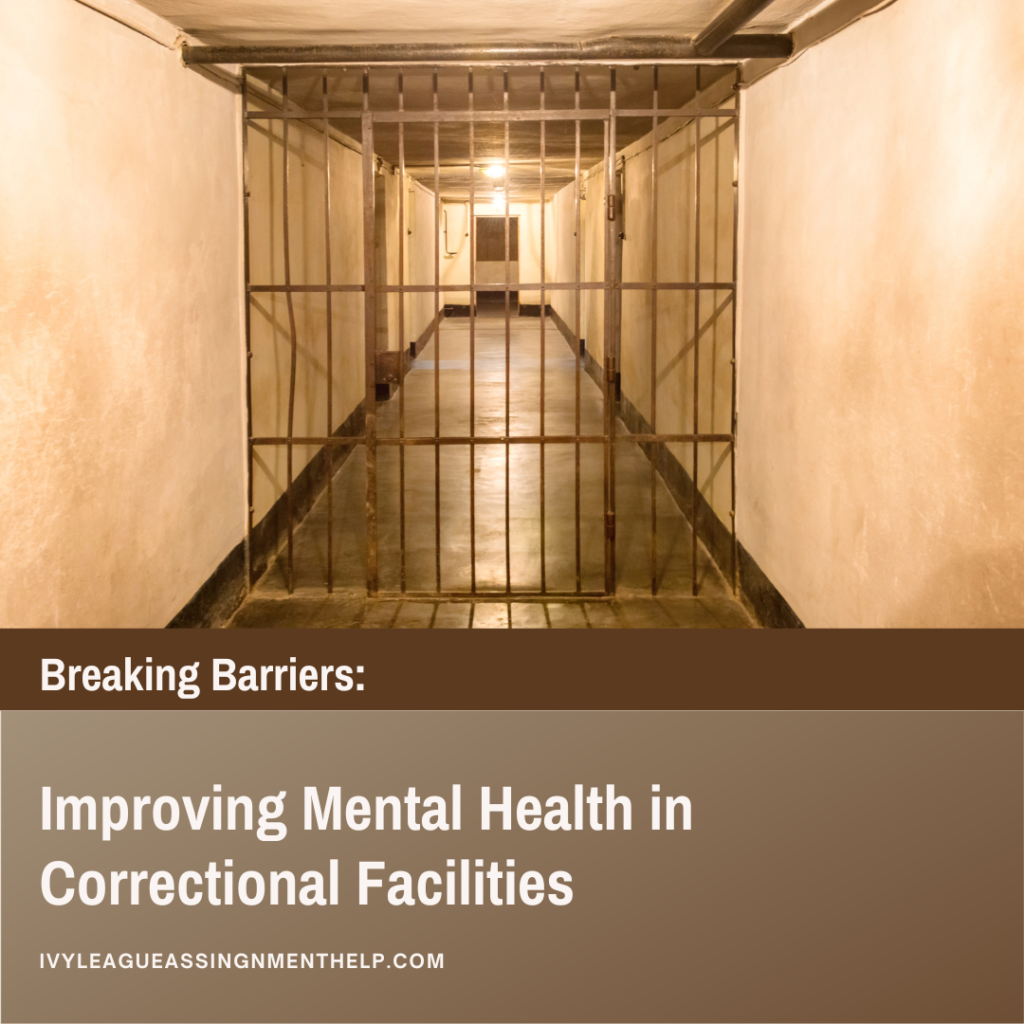Mental Health in Correctional Facilities: Challenges and Solutions
Introduction
Mental health is a significant concern in correctional facilities worldwide. Incarcerated individuals often suffer from various mental health disorders, and addressing these issues is crucial for their rehabilitation and overall well-being. At ivyleagueassignmenthelp.com we help and guide students to examine the challenges, current practices, and potential solutions for improving mental health care in correctional facilities.
Overview of Mental Health in Correctional Facilities
Definition and Importance
Mental health in correctional facilities refers to the psychological well-being of incarcerated individuals and the availability of appropriate mental health services. Effective mental health care is essential for rehabilitation, reducing recidivism, and ensuring humane treatment.
Historical Context
Historically, mental health care in correctional facilities has been neglected, with jails and prisons often becoming de facto mental health institutions. Over time, the recognition of this issue has led to efforts to improve mental health services, though significant challenges remain.

Prevalence of Mental Health Disorders
Common Disorders
| Disorder | Description |
|---|---|
| Depression | A mood disorder characterized by persistent feelings of sadness and loss of interest. |
| Anxiety Disorders | Disorders involving excessive fear, worry, and related behavioral disturbances. |
| Bipolar Disorder | A disorder characterized by extreme mood swings, including manic and depressive episodes. |
| Schizophrenia | A severe mental disorder involving distorted thinking, perceptions, and behaviors. |
| Post-Traumatic Stress Disorder (PTSD) | A disorder triggered by experiencing or witnessing traumatic events. |
Statistics and Trends
Studies show that mental health disorders are significantly more prevalent in correctional facilities compared to the general population. For example, approximately 37% of inmates in state and federal prisons and 44% of those in jails have been diagnosed with a mental health condition.
Challenges in Addressing Mental Health
Overcrowding
Overcrowded correctional facilities strain available resources, making it difficult to provide adequate mental health care. This environment exacerbates stress and mental health issues among inmates.
Stigma and Lack of Awareness
Stigma surrounding mental health disorders often prevents inmates from seeking help. Additionally, a lack of awareness about mental health issues among correctional staff can lead to inadequate responses and support.
Limited Resources
Correctional facilities frequently operate with limited budgets, restricting the availability of mental health professionals, treatment programs, and medications necessary for effective care.
Inadequate Training
Many correctional staff members lack proper training in mental health care, which can result in inappropriate handling of inmates with mental health disorders and missed opportunities for early intervention.
Current Practices
Screening and Assessment
Upon intake, inmates are typically screened for mental health issues to identify those in need of immediate care. Regular assessments help monitor their mental health status throughout their incarceration.
Treatment Programs
Treatment programs in correctional facilities include individual and group therapy, medication management, and substance abuse treatment. These programs aim to address both mental health disorders and co-occurring conditions.
Crisis Intervention
Crisis intervention strategies are crucial for managing acute mental health episodes, such as suicidal behavior or psychotic breaks. Facilities may have specialized units or protocols to handle these crises effectively.
Impact of Inadequate Mental Health Care
Recidivism
Inadequate mental health care can lead to higher recidivism rates, as untreated mental health disorders contribute to criminal behavior and hinder successful reintegration into society.
Violence and Safety Issues
Untreated mental health disorders can increase the risk of violence within correctional facilities, affecting the safety of both inmates and staff.
Human Rights Concerns
Failing to provide adequate mental health care violates the human rights of incarcerated individuals, leading to ethical and legal challenges for correctional systems.
Case Studies and Examples
Successful Programs
| Program | Description |
|---|---|
| San Francisco Jail Health Services | Provides comprehensive mental health care, including screening, treatment, and discharge planning. |
| Pennsylvania Department of Corrections | Implemented a mental health first aid training program for correctional staff. |
Lessons Learned
Successful programs demonstrate the importance of integrated care models, staff training, and collaboration with community resources to improve mental health outcomes for inmates.
Solutions and Recommendations
Policy Changes
Policy changes are needed to prioritize mental health care in correctional budgets and to establish standards for mental health services in prisons and jails.
Staff Training
Providing comprehensive training for correctional staff on mental health issues, including crisis intervention and de-escalation techniques, is essential for effective care.
Integrated Care Models
Integrated care models that combine mental health services with general health care and substance abuse treatment can address the complex needs of inmates more effectively.
Community Collaboration
Collaboration with community mental health providers ensures continuity of care upon release, supporting the successful reintegration of inmates into society.
Future Directions
Emerging Research
Ongoing research into the mental health needs of incarcerated populations and effective treatment strategies will inform future practices and policies.
Technological Advancements
Technological advancements, such as telepsychiatry and electronic health records, can improve access to mental health care and streamline service delivery in correctional facilities.
Legislative Initiatives
Legislative initiatives aimed at reforming the criminal justice system and addressing the mental health crisis in correctional facilities are crucial for long-term improvements.
Mental Health in Correctional Facilities FAQs
What are the most common mental health disorders in correctional facilities?
Common disorders include depression, anxiety, bipolar disorder, schizophrenia, and PTSD.
Why is mental health care important in correctional facilities?
Effective mental health care is essential for rehabilitation, reducing recidivism, and ensuring the humane treatment of incarcerated individuals.
What are the challenges in providing mental health care in prisons?
Challenges include overcrowding, stigma, limited resources, and inadequate staff training.
How can mental health care in correctional facilities be improved?
Improvements can be made through policy changes, staff training, integrated care models, and community collaboration.
What impact does inadequate mental health care have on inmates?
Inadequate care can lead to higher recidivism rates, increased violence, and human rights violations.
What are some successful mental health programs in correctional facilities?
Successful programs include San Francisco Jail Health Services and the Pennsylvania Department of Corrections’ mental health first aid training.
